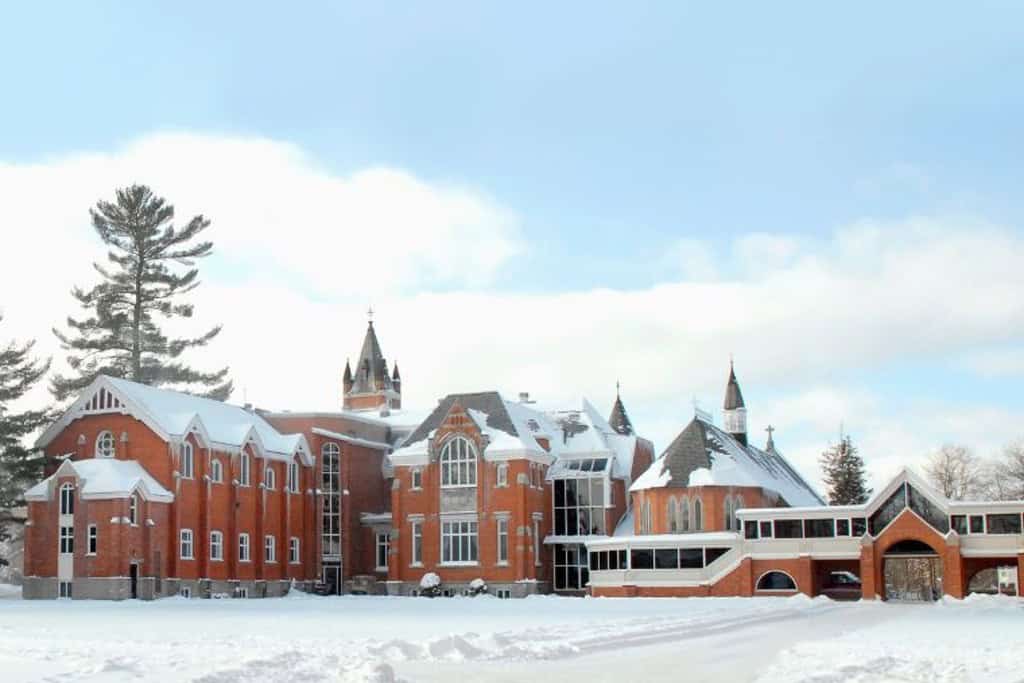
Geographically, Canada is one of the largest and best countries in terms of quality of life and a high level of capital income.
Canada is a country rich with natural beauty, featuring diverse landscapes and a cold climate, though not throughout the year.
Canada has been ranked at the top by the United Nations as the best place to live in 2020, and it also has the advantage of free healthcare that applies to international students as well. It is classified as one of the safest countries, with a crime rate that is diminished compared to America and many other countries. Ottawa, the capital city of Canada, is known for its high quality of life and welcoming environment. Toronto, the largest city in Canada, is renowned for being one of the most multicultural cities in the world. In the 19th century, about 15 million people immigrated to Canada, which helped shape the country into the large, diverse nation it is today.
Canada’s official languages, English and French, reflect its rich cultural diversity.
Because Canada is considered an attractive country for immigrants with scientific and practical skills, that’s why, it includes different nationalities from the best-skilled citizens of their countries from all around the world, who immigrated there to start a new successful life.

Study Privileges in Canada

Canada has the lowest university fees compared to the United States and England, it has programs of study that suit everyone. as study costs are low in relation to the benefits that a student gets during and after study.
It is also distinguished by its academic excellence, high-quality education institutions, and the flexibility to work during and after the study.
Canada attracts about 300,000 international students annually, and according to statistics, 93% of students are satisfied with their study experience out there. 17 Canadian universities have been ranked among the top 500 global universities.
Montreal, Toronto, Vancouver, Quebec City, and Edmonton are among the popular Canadian cities for students.
Post-study Plans

When a student chooses Canada as their study abroad destination, they take into consideration the opportunities they may earn through that Canadian experience, instead of returning to their country, they can find some work and settle for instance.
Fortunately, Canada is trying to benefit from those who study in their universities and colleges, by offering graduate students nearly a one- or two-year grace after receiving the certificate. For graduation, 95% of college and college graduates find the right job within 3 months.
Let’s get straight into it and look at the FAQ’s below:

1 – What Are the Average Prices for Majors in Canadian Colleges?
In Canada, tuition fees are usually higher for international students than for domestic students.
Here’s a list of average tuition fees for this year:
| Specialization | University Stage (USD/year) | Postgraduate (USD/year) |
|---|---|---|
| Humanities | $9,250 – $14,060 | $11,470 – $15,540 |
| Social and Behavioral Sciences | $10,360 – $14,430 | $14,430 – $17,760 |
| Law, Legal Professions, and Studies | $15,540 – $22,940 | $19,240 – $26,640 |
| Business and Public Administration | $11,840 – $15,540 | $15,540 – $19,240 |
| Executive MBA | $23,680 – $38,480 | $38,480 – $62,900 |
| Engineering | $15,540 – $19,240 | $19,240 – $23,680 |
| Medicine | $23,680 – $31,080 | $27,380 – $38,480 |
| Nursing | $11,100 – $15,540 | $14,060 – $19,240 |
| Pharmacy | $14,060 – $19,240 | $17,020 – $22,940 |
2 – What Is the Average Cost of Living in Canada?
Here’s a table of average living expenses for an academic year:
| Service Type | On Campus ($) | Off-Campus ($) |
|---|---|---|
| Housing | 7,500 – 8,500 | 9,000 – 11,000 |
| Food | 3,200 – 3,800 | 4,000 – 5,000 |
| Transportation | 450 – 600 | 1,000 – 1,500 |
| The Facilities | Included | 400 – 600 |
| Internet | Included | 550 – 650 |
| Cellphone | 250 – 350 | 350 – 450 |
| Clothes | 350 – 450 | 500 – 700 |
| Laundry | Included | 150 – 250 |
| Health Insurance | 1,000 | |
To know more details about tuition fees and cost of living, as well as how to apply and get incentives contact our counselors and they will guide you through the right path. Here’s an easy way to get in touch
3 – What are the admission requirements for colleges in Canada
The student must have completed secondary school, which is a condition for admission to one of the Canadian colleges, and the student must be evaluated based on his grades throughout the period of his studies and his level in the English language, and to complete the study.
A four-year bachelor’s degree is required for admission to graduate programs, regular diplomas are sufficient for admission with postgraduate programs as well, some institutions are interested in work experience rather than required degrees.
4 – What Are the English Language Requirements
The English language is the primary language of instruction in all institutions in Canada and the student needs to demonstrate proficiency in the English language. Canadian institutions accept two types of tests which are IELTS and TOEFL, the student needs an IELTS 6.5 score, and the TOEFL test 70-90 for admission, some colleges offer programs to complete the English language as a basic course, you do not need an English language test certificate.
5 – Is It Possible to Study in French in Canada
It is possible to study in French as a basic language in some programs, but the student needs to provide proof of mastery of the French language, which is a certificate of the French Language Assessment Test (TEF) and the French Engineering Test (TCF).
6 – What Are the Application Dates for Colleges and Institutes
Admission takes place in September, January, and May. September is the beginning of the school year. For private colleges and vocational schools, new courses start every two months. Appointments vary according to the program.
7 – How Long Is the Application and Admission Requests Processed for the Student
We recommend applying at the earliest time so that the student can obtain a study and insurance permit and finish all papers. It often takes about 60 days to process the application and obtain a letter of acceptance, after which he applies for a Canadian study permit.
8 – Can a Study Permit Application Be Rejected
If the study permit is rejected, an email will be sent with the reasons for the visa being rejected so that these problems can be solved, among the most famous reasons for refusal are first, insufficient papers proving that the student has enough cash cover to support him in Canada throughout the study period.
Then, failure to convince the application official that the student’s main purpose is to study or the student will leave the country after the end of the study period.
9 – Can the Travel Permit Be Refused Upon Arrival at the Airport in Canada
Upon arrival at a Canadian airport, the immigration officer will meet the student and inquire about the purpose of their visit, requesting the documents submitted for the travel permit application. The travel permit will be issued if the officer is satisfied with the reason for the visit. The student should carry all necessary papers and documents, such as the offer letter and proof of tuition fee payment, in their hand luggage for easy access and presentation to the immigration officer.
10 – Can a Family Member Be Brought in as a Student Escort
The spouse and accompanying minor children are welcome to accompany the student to work and study. The student can submit a visa application to them in addition to the basic student visa. The child does not need a study permit to enroll in any Canadian school.
11 – What Are Canadian Scholarships
Scholarships are an exemption from tuition fees or part of it, which is for outstanding students, a student can request a scholarship for his progress in college, it is recommended to search for grants early before the university admission process because scholarships have a specific time and end in them, and the Canadian government provides a number of grants Tuition for international students.
12 – Is It Possible to Work While Studying
Among the advantages of studying in Canada is that students in the post-secondary stage can work for up to 20 hours per week during the semester and 30 hours during half-year and late-year vacations, and they don’t need a work permit whether they work on or off campus. Canada is one of the countries that have immigration support policies, especially for those with degrees and young age. When a student finishes studying in Canada for a period of two years, the period of their stay ends and they should return to their country, but there are special programs to help international students get Canadian work experience after graduation and if they like this, they will be able to have permanent residency and eventually obtain permanent citizenship. Students who have studied two-year programs are allowed to work for three years after graduating.
13 – Does the Student Need a Work Permit
As for foreign students, when they enter the country and obtain a study permit, they become M} Hellen to work in Canada unless there are restrictions on the study permit.
14 – How Many Hours Can a Student Work per Week
A registered full-time student can work for 20 hours per week, and in seasonal vacations as a year-end vacation, you can work for 30 hours per week.
15 – What Is the Average Hourly Wage for a Student in Canada
Hourly wages vary from state to state and from one job to another, depending on the experience available to the student.
However, the lowest hourly wages in Canada are 10-15 Canadian dollars.
16 – Is It Possible to Rely on the Job for Daily Life Expenses
The number of working hours is few, but it helps the student to meet his basic needs and enhance his knowledge of the practical life and nature of society in Canada, and helps him strengthen the language of the people of the country.
17 – How Can I Work in Canada After Graduation
Canada allows foreign students to work legally upon graduation, and the experience gained from working in Canada helps students apply for permanent residence in Canada.
It is easy after graduation to directly write to companies, send companies CVs, and prepare for personal interviews.
Students can write a good CV to get an internship in big companies in vacation time so they can work in Canada after graduation from these companies.
18 – Is It Possible to Go to Canada Without an IELTS or TOEFL Exam
You can study in Canada by taking a short-term language course.
19 – Is It Possible to Work While Studying the Language
Language courses are for a short period and most of the language institutes are private institutes and not governmental, therefore it is not possible to work while studying the language only.
20 – What Is the Cheapest Way to Study in Canada
The cheapest way to study in Canada is to search for a two-year program at a Canadian college.
Colleges in Canada are distinguished by the quality of education and the abundance of study programs in them. They’re also distinguished by the fact that the price of the academic year is about half the price of the university, as some programs reach 10,000-13,000 Canadian dollars annually, and the programs are two years long and you have the choice to study at the university after those another two years or in particular to search for experience about work. This method is one of the best directions for students interested in Canada to save time and money.
The colleges are a great opportunity for the student to experience a passion for the academic subject he has chosen instead of getting involved in a 4-year university.
College housing saves you huge expenses and reduces the total cost of the school year.
The small number of students, as in the specialty in the university, the number of students is about 150-200 students, while the college is about 25-35 students.
The flexibility of study dates: There are night dates and flexible dates for students in order to be able to continue their working life besides studying.
21 – Is the Weather Bad in Canada
The weather in summer is wonderful and in winter is frigid, but with the appropriate clothes and the use of forecasting applications, you can prepare for the weather easily by using the appropriate clothes.
22 – How Can I Choose a School, University, or College in Canada
You must be admitted to a university or college to obtain a study permit, so the academic program must be chosen according to your capabilities. There are dozens of offers from colleges and universities
Choosing a college in Canada is a good option for students because it takes just 2 years.
We can help you choose the best program by talking to a university consultant for free by registering here.
23 – What Are the Procedures for Obtaining a Study Permit to Travel to Canada
You must obtain a travel permit from outside Canada. You must include in your application your acceptance letter (proof of identity, proof of the ability to pay all tuition and residence expenses in Canada)
24 – Can the Spouse of Student Work in Canada
If the student is registered in his permit that he is a full-time student in a post-secondary educational institution then your partner can obtain a work permit in Canada and can work in any job and the permit is related to the same length of the student’s permit.
25 – How Long Does It Take To Obtain a Study Permit
If you intend to study for a period longer than 6 months in Canada, you must obtain a study permit and it takes 28 days or more until it is issued.
26 – Is It Permissible to Re-Apply for a Study Permit in the Event of Refusal
You must re-submit the application in an attempt to solve problems related to the first application being rejected and notified of the rejection.
27 – What Kind of Work Is on Campus for Students in Canada
University administrative offices can employ students as interns, assistants or receptionists, shops and restaurants, campus libraries, university libraries, and cafes.
28 – What Is the Average Income That Can Be Obtained From Work While Studying
The average wage varies according to the city in which the student lives, but it can be said that, according to statistics, 600-800 Canadian dollars can be saved per month from the job.
29 – Is It Possible to Drive With a Driving License for My Country in Canada
Yes, the international driver’s license is valid in Canada for one year in most countries and can be renewed.
30 – What Are the Average Used Car Prices Appropriate for a Student
The car is essential in Canada. If you live outside the campus, you will need a car, or you can partner with someone to connect you. There are many excellent cars on the Canadian market, and their prices range from 8000-10000 dollars.
31 – What Kind of Work Is Available to Students During the Study Phase
There are many traditional and traditional works that flow among students in Canada, the most famous of which are: waiter or waitress, dog walking, salesperson, nanny, clowns, or players on a cruise ship.
32 – How Long Does a Master’s Degree Take in Canada
Studying for a master’s degree in a specialized subject usually takes one to two years.
33 – What Are the Required Documents to Apply for a Study Permit in Canada
A valid passport, travel document, application letter, to whom I send you from the visa office, a copy of the acceptance letter from your academic institution to which the student belongs, and the permit number.
34 – Is It Possible to Study in English in the Province of Quebec
The primary language in Quebec is French, but some universities and institutes study in English.
35 – Are There Additional Requirements for 18-Year-Old Students
Yes, a guardianship permit must be added to the application documentation.

If you have any questions about studying in Canada, Studygram is here to help. Our team of experts is ready to provide personalized guidance on Canadian education and assist you throughout your journey as an international student. Reach out and book a consultation for tailored advice and support. We’re committed to ensuring you make the most of your educational experience in Canada.


